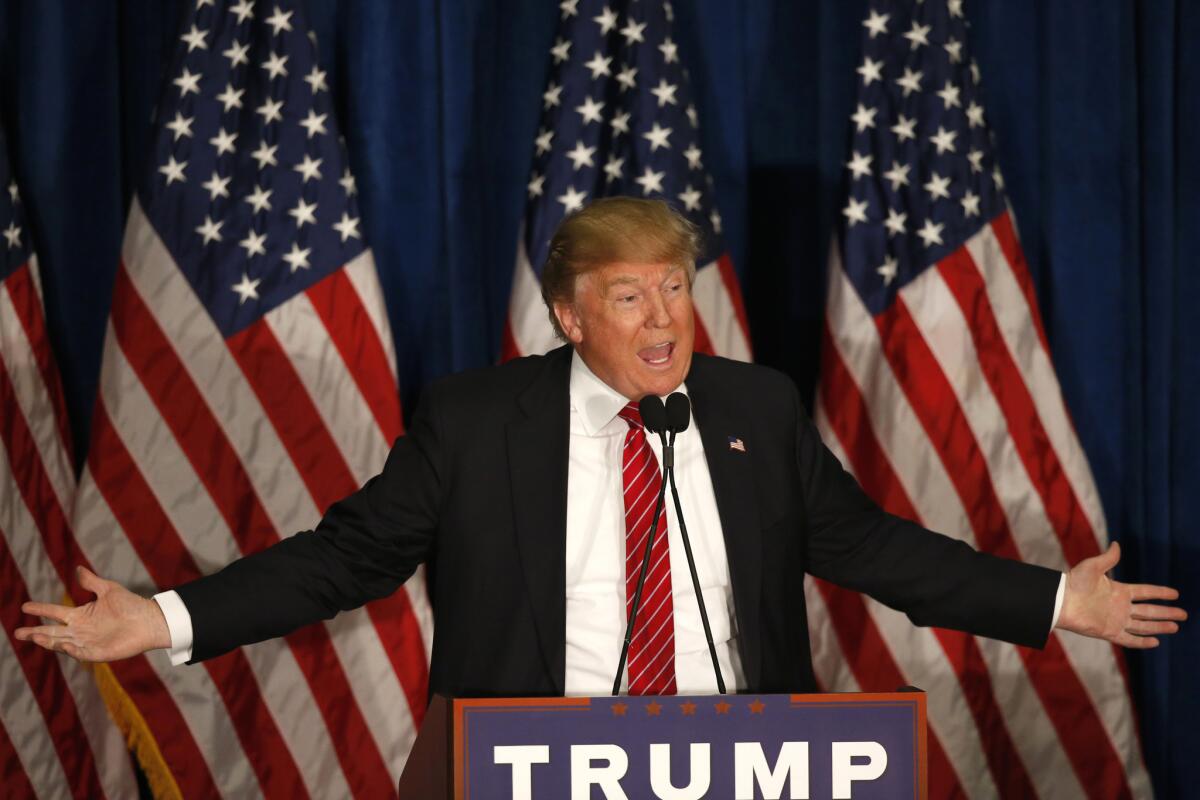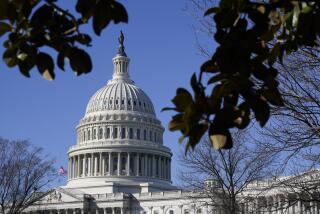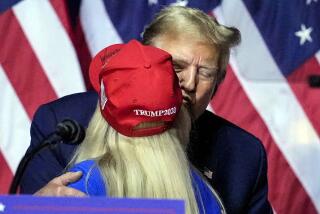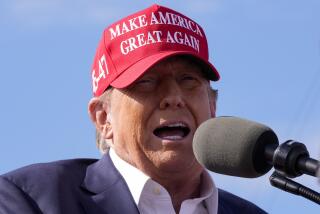How those Trump University attack ads are part of a new phase in campaign spending

Republican presidential front-runner Donald Trump speaks at campaign stop Thursday in Portland, Maine.
As Donald Trump goes for a decisive win in the March 15 Florida primary, voters there will see commercials denouncing him as a fraud.
“America, don’t make the same mistake I did with Donald Trump,” says a man in one ad, part of a trio of testimonials from people who say they were scammed by his Trump University real estate course.
The group responsible for the ad, American Future Fund, hasn’t focused on the celebrity businessman for long. Before the South Carolina primary, the group spent $1.5 million on ads calling Sen. Ted Cruz of Texas weak on defense. Ahead of the New Hampshire primary, it trained its fire on a surging Ohio Gov. John Kasich.
So who’s putting up the money for the ads, more than $5 million so far? People involved aren’t saying. The targets, though, have a theory: They think some secret benefactor is trying to help Sen. Marco Rubio of Florida.
“This is yet another desperate attempt by the out-of-touch establishment elites and dark money that control the weak politicians to maintain control of our broken and corrupt system,” said Hope Hicks, a campaign spokeswoman for Trump, who has accused Rubio backers of being responsible for the ads.
American Future Fund’s leap into Republican primary politics represents a new wrinkle in the world of so-called dark-money groups, the politically oriented nonprofits that jumped aggressively into elections after the Supreme Court’s landmark 2010 Citizens United decision. The groups can accept unlimited donations, just like a super PAC, but unlike super PACs the donors can give in secret.
Until now, American Future Fund and other conservative nonprofits avoided spending big against other Republicans. In past elections, they targeted President Obama and other Democrats, often making ideological-based arguments against taxes or government regulations. Similar groups support Democrats, though they are vastly outspent by conservative ones.
Trump blamed the new ads on an “unlawfully coordinated” effort with Rubio, at first mistakenly attributing them to a super PAC supporting Rubio, Conservative Solutions. A super PAC supporting Kasich made the same charge: “It’s going to be difficult for Rubio’s team to keep a straight face denying they are behind the shady dark-money attacks,” a spokesperson said in a statement.
Jeff Sadosky, a spokesman for Conservative Solutions, said no connection exists between his operation and American Future Fund. Joe Pounder, a spokesman for the Rubio campaign, did not address the charges directly, but said in an email that “Donald Trump just lies to cover up the con.”
American Future Fund’s founder, Iowa political operative Nick Ryan, did not return calls and emails seeking comment. Neither did Sandra Greiner, a former Republican state senator from Iowa who is now the group’s president.
Before settling on Rubio, Kasich supporters also pointed fingers at a super PAC supporting former Florida Gov. Jeb Bush, a charge also denied.
“Or it could be none of the above,” noted Chris Schrimpf, a spokesman for the Kasich campaign. “That’s the beauty of dark money. They can attack us, and you never know where it comes from.”
Dark-money ads can be more persuasive because they are coming from supposedly independent groups, said Travis Ridout, co-director of the Wesleyan Media Project, which analyzes campaign advertising. Voters tend to discount ads by competing candidates, he said.
“If you carry that to a logical extreme, that’s going to incentivize people to put money in dark-money groups,” he said.
On its website, American Future Fund is described as “a voice for conservative principles that sustains free-market ideals.” Over the last five years, it has built a record of political attack ads, serving as a conduit for funding of campaigns from Puerto Rico to California — and drawing complaints about secretive financial practices.
In 2010, at the dawn of the dark-money era, American Future Fund launched a $4-million campaign of negative ads aimed at Democrats running for Congress. Disclosure advocates quickly complained to the Federal Election Commission, “with the hope that the FEC would at least try shutting down the dark-money spigot,” said Craig Holman, government affairs lobbyist for the nonprofit consumer advocacy group Public Citizen.
The complaint went nowhere. Four years later, a divided FEC finally took up the case and deadlocked on whether to investigate. Lawyers for American Future Fund argued that the group spent most of its money on grass-roots efforts and shouldn’t be treated like a political committee.
In 2012, the group served as part of a network of nonprofit organizations linked to billionaire businessmen Charles and David Koch. These groups, after a convoluted series of money transfers, spent millions on ads to support Republicans and attack Democrats.
One of those efforts resulted in a record fine in California. That fall, American Future Fund funneled money to a campaign to push through a ballot measure aimed at restricting political spending by unions. First, though, the money was sent through another organization, also headed by Greiner, called the California Future Fund for Free Markets. An additional $11 million went to the ballot campaign through a different Koch-linked group.
The transfers were aimed at concealing the sources of the money, the state’s Fair Political Practices Commission said, and it levied a $1-million fine, one of the largest in U.S. history.
That kind of case could never happen in Washington, said Ann M. Ravel, an FEC commissioner who served on the California agency when it investigated American Future Fund.
Because of a partisan deadlock, nonprofits that want to spend on politics know they have little to fear from the FEC, she said.
“The fact that there’s so much more dark money spent in this election than ever before is really destructive to the democratic process,” she said.
The Internal Revenue Service is supposed to be another watchdog on these nonprofits, ensuring that they serve the public good and don’t just try to elect candidates; that’s the trade-off for getting a tax exemption. But the IRS has already announced it won’t try to pass new rules regulating their activities until after this fall’s election. The agency took a political beating on the issue in 2013, after employees used terms like “tea party” to select some groups for scrutiny.
This month, the IRS granted nonprofit status to Crossroads GPS, the pioneering dark-money group led by Karl Rove that spent $70 million on races in 2012.
The groups, after spending $300 million in 2012, are on pace to push even more money into the 2016 race. In 2014, and again this year, some nonprofits have been acting much like super PACs, set up to support just one candidate. Conservative Solutions Project, a nonprofit that shares consultants with Rubio’s super PAC, has reported raising $15 million and has spent $6.7 million.
Political spending by these groups has become more aggressive and blatant, without the “window dressing” of pretending they are only interested in issues, said Marcus Owens, a lawyer who once supervised nonprofit regulation for the IRS.
“I suspect that’s because the IRS has been pretty beaten up in the past few years,” he said.
With no disclosure, and no watchdogs, the candidates on the receiving end of the attacks are left fumbling for clues as to who is spending against them — and why.
Whoever is funding American Future Fund’s latest ads, it’s not the Koch brothers, said James Davis, a spokesman for Freedom Partners, the Koch-affiliated nonprofit.
Freedom Partners has not given money to American Future Fund since 2012. Davis said Freedom Partners is now evaluating the presidential contenders, and considering how to get involved in the election.
But when no one is enforcing the rules, it’s tough to advise clients to be careful about following them, Owens said. Ultimately, he said, the public might begin to lose faith in all nonprofits, including charities.
“If you’re going to swim around with all these sharks,” he said, “people are going to think you’re one too.”
joseph.tanfani@latimes.com
More to Read
Get the L.A. Times Politics newsletter
Deeply reported insights into legislation, politics and policy from Sacramento, Washington and beyond. In your inbox three times per week.
You may occasionally receive promotional content from the Los Angeles Times.







